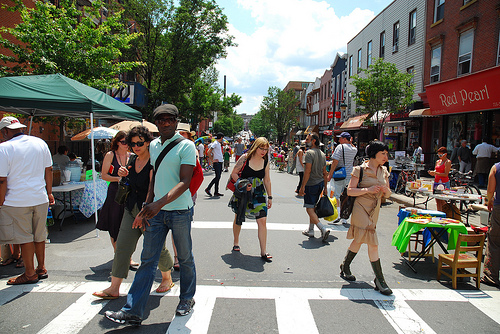Hipsters Have Not Destroyed Brooklyn

So, a long, personal think piece about Brooklyn in a national media outlet isn’t necessarily news at this point. There are a sort of a lot of those going around. As the genre goes, though, author and mixologist Dave Wondrich’s essay for this month’s Esquire, “Regarding this ‘Brooklyn’ Everyone Keeps Talking About” is a nice example, mostly full of legitimately interesting reminisces about the changes he’s seen since moving to Park Slope with his wife in 1986, when “Brooklyn was pretty much at its cultural nadir.”
Sure, interesting enough on its own merit, if you’re into that kind of thing. What’s really notable, though, is Wondrich’s unusually reasonable treatment of hipster transplants (or, per his terminology, “Young Urban Tradesmen”). It is actually… pretty measured, maybe even downright generous:
“Sure, it’s annoying, like any me-too movement is. But at least the YUTs are neat and constructive, things the punks and the hippies and the beatniks before them were most assuredly not. And while ‘hipster’ urbanism might be artificial and even silly, there’s another way of dealing with shabby old neighborhoods that happen to be sitting on prime real estate that’s a hell of a lot worse. You can see it in Manhattan, where over the past twenty years bricks and brownstone have given way to high-rise apartment towers marching cheek-to-cheek up the Bowery (where some of the brick buildings torn down were almost two hundred years old) and Sixth Avenue, and big-box chain stores have replaced a great number of the quirky businesses that made Manhattan such an interesting place to be.
[…] Hipsters might be parasites, but at least they leave the host alive, if only to feed off it. Given a choice between a neutron bomb and a hydrogen bomb, I guess I’ll take the neutrons. At least they leave an illusion of life.”
In other words, a person who could be using his platform for a useless “I was here before it was cool, get off my lawn,” manifesto is instead pointing out a fact that would be obvious, if it were more widely acknowledged: hipsters, however you define them and however determined and numerous they are, don’t really have any concrete power to gut a neighborhood and remake it in their own, incredibly expensive image.
Specifically, they’re not the ones raising rents and razing historic buildings. Moneyed landlords and developers are. The earnest, self-serious dude who moved onto your block to start a condiment business may be, well, too earnest and self-serious (maybe even a privileged shithead!), but he’s spending time making something that is not inherently destructive or awful, and most likely isn’t lobbying for condo development. It’s a complicated issue, to be sure, but one that’s not always addressed as such. Wondrich’s essay isn’t a full, unequivocal endorsement of the almost unfathomable amount of change that’s sprung up around him since moving to Park Slope — very far from it — but is a sane look at a phenomenon that people tend to be pretty insane about. Just in case you need an update today on “things that are not terrible.”
Follow Virginia K. Smith on Twitter @vksmith.
You might also like 



















